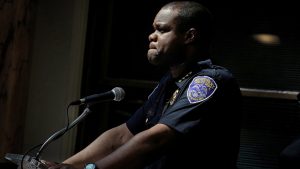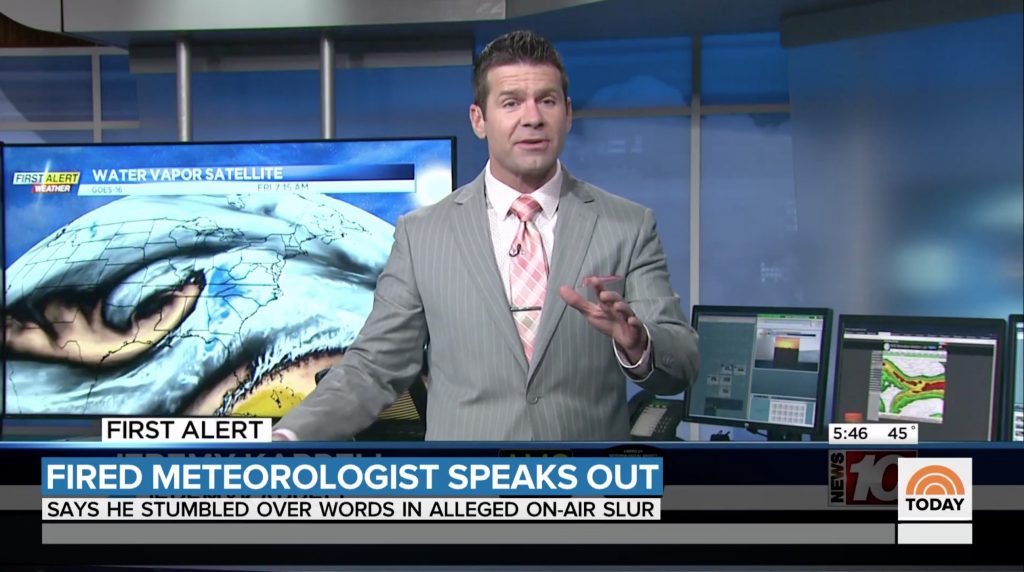A politician who has shown up as a regular part of the ensemble cast in some of my articles about my hometown is our city’s—Rochester, New York—mayor, Lovely Warren. Other than her unique name, her most defining feature might be the almost-comically-predictable response to scandal she employs, which I think I may be developing an appreciation for, or at least an expectation of. I haven’t spent a ton of time thinking about our mayor, but Mayor Warren managed once again to make national news this week. It’s a gift she has. She didn’t capture the public imagination this time for insane drama involving Daniel Prude but instead because the mayor’s husband was publicly outed as part of a cocaine-dealing network. The revelation began with a multi-residence raid by New York State Police that netted weapons and $60,000 worth of the drug.
To explain our mayor would be like dissecting any never-acknowledged element of a backdrop, like floodlights over an athletic field or a sign advertising the name of a strip mall. Mayor Warren is one-dimensional and perfectly designed for the position she holds, an indispensable reflection of the city’s priorities. In a way, in my opinion, she is like the character Schultz on Hogan’s Heroes; There’s only this one thing she does, but it’s all she needs to do to keep the fans in their seats.
This is her “one thing”; this is her version of the catchphrase “I know nothing!”:
 When the Mayor is challenged by a major accusation—which she is at a regular clip—she’ll deliver a public statement in which she routinely accepts no responsibility for the boondoggle whatsoever and commonly offers suggestions as to who you should blame instead. If it’s one of her longer speeches, she might also draw a comparison to victimized blacks from decades past to her own perceived persecution by her accusers, or she might reference The Bible. Her recent statement about her husband’s arrest and the police search of their home (it is assumed the house was their current residence together—the mayor took no questions following her public statement); she played all the familiar hits and checked off all four categories I’ve outlined.
When the Mayor is challenged by a major accusation—which she is at a regular clip—she’ll deliver a public statement in which she routinely accepts no responsibility for the boondoggle whatsoever and commonly offers suggestions as to who you should blame instead. If it’s one of her longer speeches, she might also draw a comparison to victimized blacks from decades past to her own perceived persecution by her accusers, or she might reference The Bible. Her recent statement about her husband’s arrest and the police search of their home (it is assumed the house was their current residence together—the mayor took no questions following her public statement); she played all the familiar hits and checked off all four categories I’ve outlined.
Possibly the only inclusion in the mayor’s latest speech that was newly reasoned was the suggestion there was something intentional about the timing of her husband’s arrest and her upcoming mayoral primary. The timing of the raid of her home may have been political, I don’t know, but if we continue to muse about timing; I’ll note the mayor’s husband’s alleged criminal enterprise seemed to be in full swing coincidentally at the same time that the Rochester Police Department is in disarray largely due to provocations from the mayor.
Let’s back up a little to the mayor’s previous scandal for those of you who have forgotten it:
At a Mayor Warren press conference in September 2020, she explained that Daniel Prude, the black man who died after being taken into custody by Rochester Police, deserved better but that no blame could be laid at the mayor’s feet. And while the mayor took no blame for the way the Prude case was handled, did she offer a name to the angry mob? Of course, she did. She explained that she had been told in March, months before the press conference, only that Prude had died from a drug overdose. Warren blamed her incomplete briefing on Police Chief La’Ron Singletary. Chief Singletary was reprimanded, and the police officers who had dealt with Prude were suspended.
 Rochester Police Chief Resigns After Accusations of Cover-Up in Prude Case
Rochester Police Chief Resigns After Accusations of Cover-Up in Prude Case
The Rochester Police Department's command staff, including Singletary, then resigned, it is assumed, in protest against the mayor’s accusations. The police department today, nearly a year after the resignations, has yet to recover fully. A variety of leadership positions in the organization remain unfilled. This hole in police leadership is meaningful because, at the same time our police department grapples with an internal disorder, violence in the city is running at a fever pitch. Not to get too far off-topic, but of the numerous incidents of extreme and notable violence the city has seen recently, here is a link to the video of a shoot-out in a corner convenience store. The shoot-out took place just over the head of a child in the store’s aisle.
Back to odd timing:
So isn’t it coincidental that our police department is running on three legs at the same time, the mayor’s husband decided the time was right to become a drug czar? And being conspiracy-minded myself, I wondered something far beyond the merely coincidental. To follow up on the loose plot that was developing in my head, I spoke to a source knowledgeable about the workings of the Rochester Police Department just this week. I asked if the mayor could have had inside knowledge of the Rochester Police Department beneficial to her husband’s enterprise.
My source’s initial thought was that the mayor was unlikely to have the type of information I suggested due to, ironically, the fact that the department was so dramatically understaffed. Our conversation was only transcribed quickly in my chicken-scratch note-taking, but I believe the phrase he used was that “the position did not exist” to give the mayor the sort of briefings I had in mind. Beginning with the mass exodus of talent over the mayor’s accusation of the former police chief, the police department had been in a state of (what sounded to me like) near-decomposition with retirements being historically high and new recruits not being turned out in quantities large enough to cover retirements and transfers. My source wouldn’t suggest something nefarious and unlikely just to tar the mayor, or to satisfy my enthusiasm over the possibility and juiciness of such a plot development.
But then he continued to wonder aloud about the fact the mayor has, due to changes instituted as a result of the Dan Prude incident, the ability to review body camera footage remotely. I’d assume that would mean from her home.
Well, wouldn’t that be something? I researched the issue and found that the mayor suggested such a new power for herself in an email of hers to Police Chief La’Ron Singletary dated August 6, 2020. The mayor wrote:
“Going forward, I insist that it be the official policy of the Rochester Police Department and the City of Rochester that any body-worn or other camera footage from an arrest or altercation with police that results in use of force be reviewed with the Mayor or my designee within 48 hours.” Click on "supporting documents" listed under tab 34
I suppose when that request from the mayor first appeared, it wasn’t considered by anyone that among the mayor’s circle of acquaintances would be members of a drug ring. My source didn’t take it this far, but I will: Wouldn’t drug dealers with the ability to review unreleased arrest footage of street-level dealers in their own supply chain, as well as street-level dealers in competing organizations, find the review of such footage beneficial? My source also mentioned that the trail of video the mayor has accessed is auditable, for anyone with an interest.
Now, to switch gears from the conspiratorial to the personal.
One thought weaving its way through all the mayor’s get-ahead-of-the-story speeches that I’ve heard has been the idea of forgiveness. She’s mentioned that aspiration as being a core goal of Martin Luther King’s teaching:
The mayor, of course, in the circumstances in which I’ve seen her discuss such things, is often caught wondering primarily why she shouldn’t be the recipient for the umpteenth time of forgiveness. The above quote came from a speech where she asked for Jeremy Kappell’s head on a platter. This is then, I suppose, as good a time as any to bring up Kappell.
I’ve written two articles about Kappell, and the second featured an extended interview with him. In a world in which BLM didn’t rule the day someone might make a full-length film about Kappell to dispel any residual notion that BLM is anything other than an anti-life equation (as comic-book artist Jack Kirby might have put it).
I can tell you how the Kappell film would open:
Kappell’s day would start in such a way that you’d envy him. He’d check himself out in the mirror, good-looking jock even half asleep. He’d kiss the good-looking wife and kids on the way out the door. The guy serving him coffee at Starbucks on Kappell’s way into work would recognize him as a local meteorologist, and Kappell’d get a kick of that. Kappell’d get to the office, maybe have his own parking spot, talk with co-workers about their weekend plans; he’d do his weather-man bit live on air, make a small verbal flub none of his co-workers would comment on, he’d head out the door back home.
The following day, Saturday, the film could intercut between the Kappell family doing the weekend thing and also all manner of political drama taking place without Kappell’s knowledge over his verbal flub. There would in certain quarters of the city be an accusation that Kappell had not flubbed a word but instead uttered a racial slur with deliberate intent.
Sunday, all hell would break loose. Mayor Lovely Warren would do her press conference talking forgiveness but calling for Kappell to suffer consequences. Kappell would be let go by his station without an investigation that involved Kappell’s participation. By Monday morning, Kappell’d be known nationally as the racist weatherman. His life would begin to unravel, buoyed fleetingly by small glimmers of hope. One such glimmer of hope would be nationally renowned weatherman Al Roker coming to Kappell’s defense. Another would be a near-meeting arranged with Mayor Lovely Warren at which Kappell could make a case for mercy.
 Possibly not reported by anyone previously was what Kappell told me in our second interview this week about a near-meeting with the mayor. Immediately after Kappell was fired by his station, he made the media rounds and received support from surprising corners. Kappell recalled to me,
Possibly not reported by anyone previously was what Kappell told me in our second interview this week about a near-meeting with the mayor. Immediately after Kappell was fired by his station, he made the media rounds and received support from surprising corners. Kappell recalled to me,
“Al Roker came out in support, The Today Show and the entire crew of The Today Show came in support. And then later, we were getting support from even Don Lemon from CNN. I was on his show, and then we were covered by BBC news and then the daughter of Martin Luther King, Dr. Bernice King, came out and voiced her support, saying I should not have lost my job. So, all that happened the week that followed the firing. He came out I think it was a week after that, Mr. Johnson started contacting me.”
The Mr. Johnson that Kappell refers to is a former mayor of Rochester, Bill Johnson. Johnson, I would guess, saw that the current mayor of Rochester Lovely Warren, also a black democrat, put her foot in it, and so he tried to mediate a truce between Kappell and Warren. Unfortunately, the stars did not align. Warren wanted Kappell to come to their meeting without representation. Kappell’s lawyer advised against any meeting without his participation, and so the meeting did not happen.
Kappell’s professional life continued to unravel. He recalled to me,
“I spent 20 years working on this career, so 20 years it took me to make the salary I was making. We were living at home (Indiana), so we didn't need to be up here. I say 'we,' my wife and I both are from southern Indiana near Louisville, that market. We were happily working out of the Louisville market for a good reputable TV station, a family-owned TV station. They were very happy to have us down there. They probably would have kept us for as long I would have liked to stay and work, but we came up here specifically for a promotion and being able to run a weather department up here in the Great Lakes. It had an appeal to it, and they threw a bunch of money at us. So yeah, that’s why we ended up coming. Afterward, I applied to a handful of television stations, including one in town, WROC. They had an opening after their chief left for my old job. We were given an opportunity… We could have moved to, for instance, Minneapolis, Minnesota, wanted us, but they were going to offer us 50K, 60K less than we were making here. And I decided I didn't just want to keep chasing this career and what we were dealing up here was a lot more important.”
Kappell didn’t particularly want to run from western New York as if to admit defeat. He stayed, and to keep food on the table, Kappell bartended while he also attempted to launch a podcast. The bartending gig offered plenty of awkward opportunities for strangers to bring up what Kappel refers to as “the calamity.” Think of the scene in Mickey Rourke’s The Wrestler where he’s working at a deli counter. And the podcast hit a wall in attracting advertisers once Covid hit.
“We were solvent with that business within about a year of starting it. Local sponsors were helping us. We had probably 15, 20 local sponsors that were working with us, but then the coronavirus hit. They were all local, and 2/3rds of them had to pull their advertising, so we had to go in another direction.”
Kappell has irons in the fire, including a new podcast this time with a political component, but the going has been choppy at best. He describes himself as currently under-employed, and the family has had to sell their home.
 Meanwhile, across town, the mayor whose political grandstanding involved standing on Kappell’s grave is currently hoping to be reelected soon, and so asks that people forgive and forget that she shares a residence with one of Rochester’s cocaine dealers, and that they raise a daughter in a house stocked with illegal weapons.
Meanwhile, across town, the mayor whose political grandstanding involved standing on Kappell’s grave is currently hoping to be reelected soon, and so asks that people forgive and forget that she shares a residence with one of Rochester’s cocaine dealers, and that they raise a daughter in a house stocked with illegal weapons.


